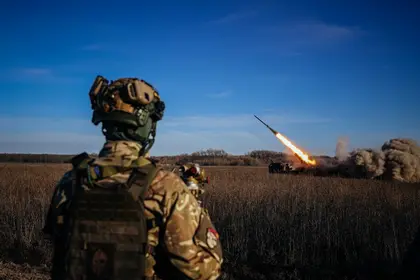Ukraine claims that Russia is preparing a fresh offensive against Kyiv early next year, but analysts doubt that Moscow can regenerate its battered forces for such a major operation is so short a timeframe.
Speaking to The Economist magazine this week, Ukrainian commander-in-chief General Valeriy Zaluzhny said he expected a new Russian assault on Kyiv in the first months of 2023.
JOIN US ON TELEGRAM
Follow our coverage of the war on the @Kyivpost_official.
"The Russians are preparing some 200,000 fresh troops. I have no doubt they will have another go at Kyiv," Zaluzhny said.
A major Russian attack could come "in February, at best in March and at worst at the end of January," he added.
Although Russia mobilised 300,000 reservists between September and October, military experts say the new troops are unlikely to be sufficiently trained or equipped to attempt another storming of the Ukrainian capital.
A first attempt in February and March ended in humiliation thanks to fierce defensive efforts by Ukraine coupled with major supply, intelligence and command problems in the Russian ranks.
"Such an offensive does not appear very probable to me, but it's not impossible at the same time," independent Russian military analyst Alexander Khamchikhin told AFP.
Discussing Russian capabilities recently, US military expert Michael Kofman also judged Russia going on the offensive as a "rather unlikely scenario".
"They have significant ammunition constraints and the Russian military's performance now is very closely tied to the availability of artillery ammunition fires," Kofman told the War on the Rocks podcast.

EU Transfers €1.5 Bln Raised From Russian Assets for Ukraine
Asked about the comments on Friday, the White House cast doubt on them.
"We aren't seeing any indication that there's an imminent move on Kyiv," said White House spokesman John Kirby.
Pentagon spokesman Pat Ryder declined "to get into speculating on potential future ops" but added that "we know that Russia continues to try to take offensive action."
- Russian commander -
Russia's future military capabilities in Ukraine will depend in large part on new commander Sergey Surovikin, a veteran of Moscow's wars since the Soviet invasion of Afghanistan.
The shaven-headed general with a reputation for ruthlessness has been tasked with integrating the newly drafted soldiers and regenerating Russia's badly damaged combat units.
Australian general Mick Ryan stressed that Surovikin was also working on unifying Russia's fractured command system and trying to better integrate air support with ground operations.
"Surovikin commands an army that suffers from low morale and keeps losing its people and best equipment," Ryan wrote in Foreign policy magazine.
"So far, evidence suggests that the troops Russia has mobilized to replace the dead and injured are not receiving the kind of demanding training they need to succeed."
He warned, however, that the Siberia-born commander was "almost certainly drawing up battle plans that are clearly focused, unlike past assaults that spread Russia's troops thin."
- Western help -
Any attack on Kyiv would be immensely complicated and the city would be almost impossible to capture without destroying it.
"Taking a city without destruction is difficult, apart from cases where there is a decision to surrender, such as in Paris in 1940," Khamchikhin said.
Pascal Ausseur, director of the Mediterranean Foundation for Strategic Studies, a France-based think-tank, said the Ukrainian claims were an effort to concentrate minds in Western capitals.
Ukraine has held out since February and turned the tide of Russia's invasion thanks to an influx of Western financial help and high-tech weaponry.
"The Ukrainians are shouting 'keep helping us, don't let us down'," Ausseur told AFP. "These statements are destined for the West to say 'we can still lose everything'."
They might also be a diversion tactic as Ukraine looks to go on the attack in the southeast as the ground freezes in mid-winter, making it easier for vehicles to travel off-road.
"I would find it strange for the Ukrainians to put themselves in defensive positions which would stop them launching an offensive operations before March," Ausseur said.
You can also highlight the text and press Ctrl + Enter






